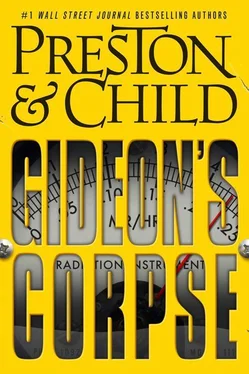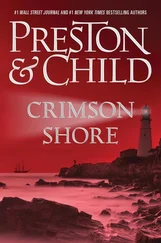Not a word was said. Dart himself had spoken mildly, but something about the very quietness of his voice told Gideon the guy wasn’t kidding.
“I apologize,” said Dart, “for the inconvenience and the scare. Fortunately, it appears the exposure for all of you was slight to none. I will now turn you over to the very competent hands of Dr. Berk. Good day.”
And he left.
The doctor consulted his clipboard. “Let’s see. We’re going to proceed alphabetically.” Now he was like a camp counselor. “Sergeant Adair and Officer Corley, please come with me?”
Gideon glanced around at the assembled group. The SWAT team member who had freaked out in the van was no longer with them, and he thought he could hear, faintly, somewhere in the bowels of that vast facility, the man screaming and threatening.
Suddenly the door opened and Myron Dart reentered, accompanied by Manuel Garza. Dart looked seriously put out. “Gideon Crew?” His eyes fastened on Gideon, and he fancied he saw recognition in those eyes.
Gideon rose.
Garza came over. “Let’s go.”
“But—”
“No discussion.”
Garza walked rapidly to the door, Gideon hurrying to keep up. As they passed Dart, the man looked at him with a cool smile. “You have interesting friends, Dr. Crew.”
During what promised to be a long crosstown ride to Little West 12th Street, in gridlock traffic, Garza said nothing, his eyes straight ahead, concentrating on driving. The nighttime streets of New York were their usual blaze of light, action, noise, and bustle. Gideon could feel the man’s dislike of him radiating from his face and body language. Gideon didn’t care. The silence let him prepare for what he was sure was going to be an unpleasant confrontation. He had a pretty good idea of what Glinn would want now.
When Gideon was twelve, he had witnessed his father gunned down by FBI snipers. His father had been a civilian cryptologist working for INSCOM, the United States Army Intelligence and Security Command, and had been involved with the group that developed codes. The Soviets broke one of those codes only four months after it was introduced, and twenty-six operatives and double agents had been rolled up in a single night, all tortured and killed. It was one of the worst intelligence disasters of the Cold War. They had said it was his father’s fault. His father had always suffered from depression, and under the pressure of the accusations and investigations he broke down, took a hostage, and was shot and killed in the doorway of Arlington Hall Station—after he had surrendered.
Gideon had witnessed the entire thing.
In the years following, Gideon’s life had gone off the rails. His mother began drinking. A succession of men came and went from the house. They moved from town to town, following one broken relationship or school expulsion after another. As his father’s money had dwindled, they lived in houses, then apartments, trailers, motel rooms, and boardinghouses. His strongest memory of his mother during those years was of her sitting at the kitchen table, glass of Chardonnay in her hand, cigarette smoke curling about her raddled face with its thousand-yard stare, Chopin’s Nocturnes playing in the background.
Gideon was an outsider and he developed a loner’s interests: math, music, art, and reading. One of their moves—he was seventeen at the time—had brought them to Laramie, Wyoming. One day, he’d gone into the local historical society and spent the day, killing time instead of going to school. Nobody would find him—who’d think of looking there? Occupying an old Victorian house, the historical society was a dusty warren of rooms with dark corners, packed with memorabilia and Western bric-a-brac—six-shooters that killed famous outlaws nobody had ever heard of; Indian artifacts; pioneer curios; rusty spurs; bowie knives; and a miscellany of paintings and drawings.
He found refuge in a room in the back where he could read. After a while his attention was attracted by a small woodblock print, one of many badly hung prints wedged uncomfortably along a wall. It was by an artist he had never heard of, Gustave Baumann, and it was called Three Pines . A simple composition, with three small, straggly trees, growing on a barren ridge. But somehow, the more he stared at the print, the more it drew him in; the more remarkable, even miraculous, it became. The artist had managed to imbue those three pines with a sense of dignity, of worth, of essential treeness .
The back room at the historical society became his refuge. They never figured out where he was. He could even strum his guitar and the deaf old lady who dozed at the admissions desk never noticed. He didn’t know how or why, but over time Gideon fell in love with those snaggle-toothed trees.
And then his mother lost her job and they were going to have to move again. Gideon hated to say good-bye to the print. He couldn’t imagine never seeing it again.
And so he stole it.
It turned out to be one of the most thrilling things he’d ever done. And it had been so easy. A few casual questions revealed that the historical society had virtually no security, and its set of dusty accession catalogs was never checked. So one bitterly cold winter’s day he walked in with a small screwdriver in his back pocket, removed the print from the wall, and put it under his coat. Then, before leaving, he wiped down the wall the print had been hung on to get rid of the dust mark, shifted two other prints to cover up the screw holes and obscure the gap. The entire process took five minutes, and when he was done nobody would even know a print was missing. It was, truly, a perfect crime. And Gideon told himself it was justified—nobody loved the print, nobody saw the print, nobody even looked at it, and the historical society was letting it rot in a dark corner. He felt virtuous, like a father adopting an unloved, orphaned child.
But what a delicious thrill it had been. A physical sensation. For the first time in years he felt alive, his heart pounding, his senses razor-keen. Colors seemed brighter; the world looked different—at least for a while.
He hung the print above the bed in his new room in Stockport, Ohio, and his mother never noticed it, never remarked on it.
He was sure the print was almost worthless. A few months later, browsing through various auction catalogs, he discovered it had a value of six to seven thousand dollars. At the time his mother was in desperate need of rent, and he considered selling it. But he couldn’t imagine parting with it.
But by that time he needed another thrill. Another fix.
So he began to haunt the nearby Muskingum Historical Site, where they had a small collection of etchings, engravings, and watercolors. He picked out one of his favorites, a lithograph by John Steuart Curry called The Plainsman , and stole it.
Piece of cake.
It came from an edition of two hundred fifty, and so was untraceable and thus easy to sell on the legitimate market. The World Wide Web was just coming into being, which made it all so much easier and anonymous. He got eight hundred dollars for the print—and his career as a small-time historical society and art museum thief was launched. His mother never had to worry about rent again. Gideon made up vague stories about odd jobs and helping after school, and she was too addled and desperate to question where the money was really coming from.
He stole for money. He stole because he loved certain specific pictures. But most of all, he stole for the thrill. It created a high like nothing else, a feeling of self-worth, of floating above the hidebound, mindless, and blinkered masses.
He knew these were not worthy feelings, but the world was a messed-up place, so why not step outside the rules? He hurt nobody. He was like Robin Hood, lifting unappreciated works of art and putting them in the hands of people who truly loved them. He went on to college, soon dropped out, moved to California, and ultimately devoted himself full-time to visiting small museums, libraries, and historical societies, selling what he had to and keeping the rest.
Читать дальше












